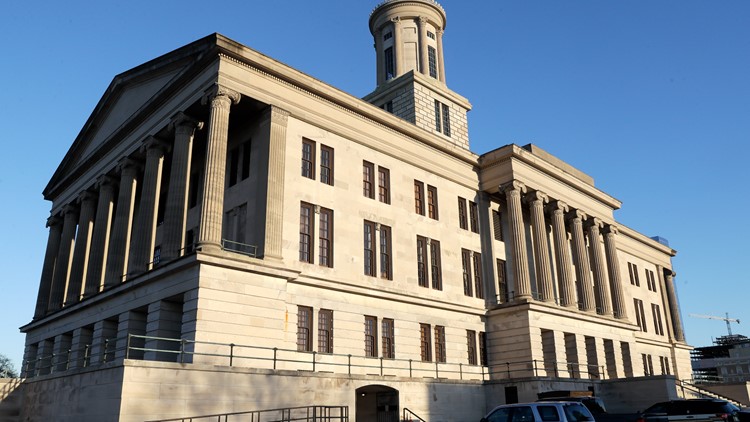NASHVILLE, Tenn. — The Tennessee Senate on Thursday approved a nearly $2 billion tax and refund for businesses, a proposal designed to prevent threats of a potential lawsuit even as critics warned the so-called solution was rushed without being properly vetted and shrouded in mystery.
Starting last fall, Republican legislative leaders say a law firm representing a large group of businesses contacted the state to question the legality of Tennessee's 90-year-old franchise tax and demanded a refund. In response, Gov. Bill Lee initially proposed offering businesses $1.2 billion in refunds and then an ongoing $410 million in tax breaks.
That amount has since been tweaked in the Senate to $1.56 billion in refunds and $393 million in tax breaks, totaling $1.95 billion.
“This bill will put this issue behind us and address it in a responsible way,” said Republican Sen. Ken Yager, adding that doing so could make the state more competitive in attracting businesses to move to Tennessee.
At issue are concerns that the state's franchise tax violates a U.S. Constitution's Commerce Clause provision, which bans states from passing laws that burden interstate commerce. Further adding to the legal woes is a 2015 case involving the U.S. Supreme Court striking down Maryland's tax that the justices ruled had the effect of double-taxing income residents earn in other states.
Maryland allowed its residents to deduct income taxes paid to other states from their Maryland state tax, but it did not apply that deduction to a local “piggy back” tax collected for counties and some city governments — something that the high court decided was illegal.
Yet details about what specific businesses raised the original legal concerns have remained hidden. State leaders have refused to disclose what businesses have requested a refund. The original number of the group of businesses who reached out to lawmakers last fall was originally disclosed at around 80, but on Thursday, Yager mentioned that the law firm represented “hundreds” of individuals.
Meanwhile, it's unclear what other possible options were considered. There have also been grumblings that Lee's personal business, the Franklin-based Lee Co., could benefit from this legislation.
On Thursday, Democratic lawmakers pointed out the unusualness of the Republican-dominant Statehouse to move quickly to avoid a lawsuit when GOP members regularly advance legislation knowing it could face potential litigation.
“We are having this discussion as if we have to and we’re under the gun,” said Sen. Jeff Yarbro, a Democrat. “I don’t think that's appropriate.”
The legislation passed 25-6 on Thursday, with only Democrats voting against. The bill must still clear the House chamber.
“Nobody likes this solution. The governor doesn’t like this solution. Revenue doesn’t like this solution. The attorney general doesn’t like this solution, but the reality is this is the best solution,” said Sen. Bo Watson, the Republican chair of the Senate’s Finance, Ways and Means Committee, as he raised in voice and admonished the Democrats criticizing the plan.
House Speaker Cameron Sexton told reporters Thursday that his chamber’s version of the bill will be different. He said it will include a nearly $400 million tax cut, but the other part of the legislation will differ, and declined to address further specifics while the House’s amendment is being drawn up. House Majority Leader William Lamberth said he will likely file the amendment Monday.
“It will still be a significant tax cut for businesses in Tennessee,” Lamberth said.
The franchise tax debate comes as Tennessee lawmakers are also being asked by the Republican governor to sign off on an universal school voucher proposal estimated to cost hundreds of millions in tax dollars. Lee has attempted to assure skeptics there is enough revenue to cover all the state's commitments amid stagnant state revenues.



